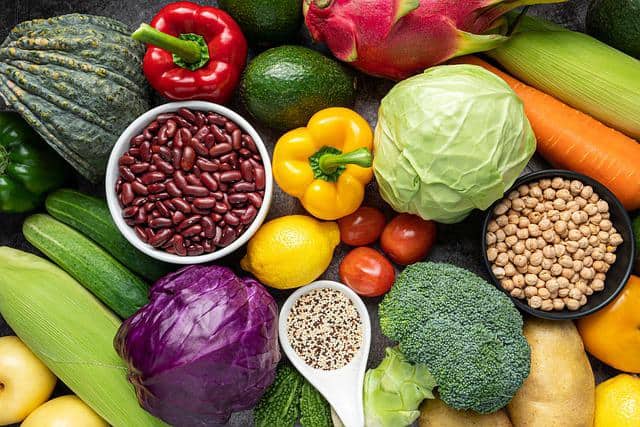Healthy, glowing skin is often considered the ultimate marker of wellness and vitality. While skincare routines and topical treatments play a crucial role, the foundation for radiant skin starts from within. A balanced diet rich in essential nutrients can transform your skin’s appearance and function. This comprehensive guide delves into the diet for healthy skin, offering dietary recommendations, tips for maintaining skin health, homemade facial recipes, and a detailed diet chart to guide you on your journey to luminous skin.

The Connection Between Diet and Skin Health
Our skin serves as a window into our interior well-being. what we eat affects the skin’s appearance, texture, and overall health. Nutrient deficiencies, poor diet choices, and imbalances can manifest as dullness, dryness, acne, and other skin issues. Conversely, a well-balanced diet full of antioxidants, healthy fats, vitamins, and minerals can enhance skin elasticity, hydration, and glow.
Essential Nutrients for Healthy Skin
Antioxidants
Antioxidants fight free radicals that can damage skin cells and accelerate aging. Key antioxidants include vitamins C and E, selenium, and beta-carotene.
Healthy Fats
Omega-3 and omega-6 fatty acids help maintain the skin’s lipid barrier, which is crucial for hydration and elasticity. These fats are found in fish, nuts, and seeds.
Vitamins
Vitamin A
Vitamin A is necessary for the growth and repair of skin cells Found in sweet potatoes, carrots, and spinach.
Vitamin C
Vitamin C: Promotes the production of collagen and guards against UV ray damage. Found in citrus fruits, bell peppers, and strawberries
Vitamin E
Protects against oxidative stress and supports skin repair. Found in nuts, seeds, and green leafy vegetables.
Minerals
Zinc
Regulates oil production and reduces inflammation.found in eggs, fish, and nuts from Brazil
Selenium
Protects against skin damage from UV exposure. Found in Brazil nuts, seafood, and eggs.
Water
Hydration is fundamental for maintaining skin’s elasticity and suppleness. Drinking enough water throughout the day helps keep the skin hydrated from the inside out.
What to Eat for Healthy Skin

1. Fruits and Vegetables
Berries:
Rich in antioxidants like vitamin C and flavonoids, berries (such as blueberries, strawberries, and raspberries) help protect the skin from oxidative damage.
Citrus Fruits
Oranges, grapefruits, and lemons are packed with vitamin C, which is crucial for collagen production and skin repair.
Leafy Greens
Spinach, kale, and Swiss chard provide vitamins A, C, and E, as well as antioxidants that protect the skin and support healing.
2. Healthy Fats
Avocados
High in healthy fats and vitamin E, avocados help moisturize the skin and maintain its elasticity.
Fatty Fish
Salmon, mackerel, and sardines are rich in omega-3 fatty acids, which reduce inflammation and support a healthy skin barrier.
Nuts and Seeds
Almonds, walnuts, flaxseeds, and chia seeds provide omega-3 fatty acids and vitamin E, supporting skin hydration and protection.
3. Whole Grains
Quinoa
A great source of zinc and antioxidants, quinoa supports skin repair and hydration.
Oats
Rich in fiber and antioxidants, oats can help regulate blood sugar levels and reduce skin inflammation.
4. Lean Proteins
Chicken and Turkey:
Provide essential amino acids for skin repair and collagen production.
Legumes
Beans, lentils, and chickpeas offer plant-based protein and antioxidants that support skin health.
5. Herbal Teas
Green Tea
Contains antioxidants called catechins that protect the skin from sun damage and improve skin elasticity.
Chamomile Tea
Known for its anti-inflammatory properties, chamomile can soothe irritated skin and reduce redness.
Tips for Maintaining Healthy Skin

Remain Hydrated:
1.To keep your skin hydrated and help remove toxins, sip lots of water throughout the day.
2..Consume a Balanced Diet
Make sure your meals include a range of fruits, vegetables, whole grains, lean meats, and healthy fats.
3. Limit Processed Foods
Reduce intake of sugar, refined carbohydrates, and processed foods, as they can lead to inflammation and breakouts.
4. Avoid Excessive Sun Exposure
Protect your skin from UV rays by wearing sunscreen and avoiding prolonged sun exposure.
5. Get Adequate Sleep:
Quality sleep supports skin repair and regeneration. Aim for seven to nine hours of sound sleep every night
6. Manage Stress
High stress levels can affect skin health.
Homemade Facials for Healthy Skin
In addition to a nutritious diet, homemade facials can enhance your skin’s appearance. Here are a few recipes using natural ingredients that are gentle on the skin and easy to prepare:
1. Honey and Yogurt Face Mask
Ingredients:
2 tablespoons of honey
2 tablespoons of plain yogurt
Instructions:
Mix honey and yogurt in a bowl until well combined.
Avert the eye region when applying the mixture on your face
After leaving on for 15 to 20 minutes, rinse with warm water.
Benefits: Honey is a natural humectant that locks in moisture, while yogurt contains lactic acid that gently exfoliates and brightens the skin.
2. Avocado and Olive Oil Face Mask
Ingredients
1 ripe avocado
1 tablespoon of olive oil
Instructions:
Mash the avocado in a bowl until smooth.
Mix in the olive oil.
Apply the mixture to your face and leave on for 15-20 minutes.
Rinse off with warm water.
Benefits:
Avocado is rich in healthy fats and vitamins that nourish and hydrate the skin, while olive oil adds an extra layer of moisture.
3. Green Tea and Honey Face Scrub
Ingredients:
2 tablespoons of green tea leaves (cooled)
1 tablespoon of honey
1 tablespoon of sugar or ground oats
Instructions:
Combine the green tea leaves, honey, and sugar (or oats) in a bowl.
Utilizing circular motions, gently massage the mixture onto your face.
Rinse off with warm water.
Benefits:
Green tea is packed with antioxidants that reduce inflammation, while the sugar or oats provide gentle exfoliation to remove dead skin cells.
7-Day Vegetarian Diet Chart for Healthy Skin

A vegetarian diet can be incredibly effective for promoting healthy skin. By focusing on nutrient-rich foods and maintaining balance, you can support your skin’s vitality and glow. Here’s a comprehensive 7-day vegetarian diet chart designed to nourish your skin and boost overall health.
Monday
Morning
Breakfast:
Smoothie bowl with spinach, banana, frozen berries, chia seeds, and almond milk. Top with sliced almonds and a few fresh berries.
Drink:
A glass of water or green tea.
Mid-Morning Snack
Snack:
A handful of walnuts and a pear.
Lunch
Main Dish:
Quinoa salad with chickpeas, cherry tomatoes, cucumber, bell peppers, and a lemon-tahini dressing.
Drink:
A glass of water.
Afternoon Snack
Snack:
Carrot sticks with hummus.
Dinner
Main Dish:
Lentil soup with spinach and sweet potatoes. Serve with a side of whole-grain bread.
Drink:
A glass of herbal tea (e.g., chamomile or peppermint).
Evening:
Dessert:
A bowl of mixed fresh fruit (e.g., apple, orange, kiwi).
Tuesday
Morning
Breakfast:
Overnight oats made with rolled oats, almond milk, chia seeds, and topped with sliced banana and a drizzle of honey.
Drink:
A glass of water or green tea.
Mid-Morning Snack:
Snack: Greek yogurt with a handful of granola.
Lunch:
Main Dish:
Stuffed bell peppers with brown rice, black beans, corn, and avocado. Serve with a side of salsa.
Drink:
A glass of water.
Afternoon Snack
Snack:
A small handful of mixed nuts (e.g., almonds, cashews, and pistachios).
Dinner
Main Dish:
Stir-fried tofu with mixed vegetables (broccoli, bell peppers, carrots) and a side of brown rice.
Drink: A glass of herbal tea.
Evening
Dessert: A small bowl of chia pudding (made with chia seeds, almond milk, and a touch of vanilla extract).

Wednesday
Morning
Breakfast:
Whole-grain toast with avocado spread and a sprinkle of chia seeds. Serve with a side of mixed berries.
Drink:
A glass of water or green tea.
Mid-Morning Snack
Snack
A small apple and a few almonds.
Lunch
Main Dish:
Spinach and chickpea salad with cherry tomatoes, cucumbers, red onion, and a balsamic vinaigrette.
Drink: A glass of water.
Afternoon Snack
Celery sticks with almond butter.
Dinner
Main Dish: Vegetable curry with cauliflower, peas, and carrots served over basmati rice.
Drink: A glass of herbal tea.
Evening
Dessert: Fresh fruit salad with a splash of lime juice.
Thursday
Morning
Breakfast: Smoothie made with kale, pineapple, mango, and coconut water. Add a tablespoon of flaxseeds for extra nutrients.
Drink: A glass of water or green tea.
Mid-Morning Snack
Snack: A handful of trail mix (nuts, seeds, and dried fruit).
Lunch
Main Dish: Sweet potato and black bean burrito bowl with quinoa, avocado, and salsa.
Drink: A glass of water.
Afternoon Snack
Snack: Greek yogurt with a spoonful of honey and a sprinkle of pumpkin seeds.
Dinner
Main Dish: Stuffed zucchini boats with a mixture of brown rice, tomatoes, and herbs. Serve with a side of steamed green beans.
Drink: A glass of herbal tea.
Evening
Dessert: Baked apple with a sprinkle of cinnamon.
Friday
Morning
Breakfast: Chia seed pudding made with coconut milk and topped with fresh strawberries and a sprinkle of sunflower seeds.
Drink: A glass of water or green tea.
Mid-Morning Snack
Snack: A handful of edamame.
Lunch
Main Dish: Roasted vegetable and quinoa salad with a lemon-dijon dressing.
Drink: A glass of water.
Afternoon Snack
Snack: A small orange and a few almonds.
Dinner
Main Dish: Spaghetti with marinara sauce made from tomatoes, garlic, and basil. Serve with a side of steamed broccoli.
Drink: A glass of herbal tea.
Evening
Dessert: A small bowl of frozen yogurt topped with a few fresh berries.
Saturday
Morning
Breakfast: Whole-grain pancakes topped with fresh fruit and a drizzle of maple syrup.
Drink: A glass of water or green tea.
Mid-Morning Snack
Snack: Sliced cucumber with a dollop of hummus.
Lunch
Main Dish: Mediterranean-style quinoa bowl with olives, feta cheese, cucumbers, tomatoes, and a drizzle of olive oil.
Drink: A glass of water.
Afternoon Snack
Snack: A small handful of dried apricots and walnuts.
Dinner
Main Dish: Black bean and vegetable stir-fry with tofu and a side of jasmine rice.
Drink: A glass of herbal tea.
Evening
Dessert: A fresh fruit smoothie made with almond milk and a handful of spinach.
Sunday
Morning
Breakfast: Muesli with almond milk, fresh apple slices, and a sprinkle of chia seeds.
Drink: A glass of water or green tea.
Mid-Morning Snack
Snack: A small bowl of mixed berries.
Lunch
Main Dish: Lentil and vegetable stew with a side of whole-grain bread.
Drink: A glass of water.
Afternoon Snack
Snack: Sliced bell peppers with guacamole.
Dinner
Main Dish: Stuffed portobello mushrooms with spinach, garlic, and a sprinkle of Parmesan cheese. Serve with a side of roasted sweet potatoes.
Drink: A glass of herbal tea.
Evening
Dessert: A bowl of Greek yogurt with a drizzle of honey and a few sliced almonds.
Additional Tips
Hydration: Drink plenty of water throughout the day, aiming for at least 8 glasses.
Portion Control: Adjust portion sizes based on your individual needs and activity level.
Variety: Incorporate a wide range of fruits, vegetables, grains, and proteins to ensure a diverse nutrient intake.
Preparation: Prepare meals in advance when possible to maintain consistency and make healthy eating easier.
By following this 7-day vegetarian diet chart, you’ll provide your skin with the essential nutrients it needs to thrive, promoting a healthy, glowing complexion.
Drink: A glass of herbal tea.
Evening
Dessert: A bowl of evel.
Variety: Incorporate a wide range of fruits, vegetables, grains, and proteins to ensure a diverse nutrient intake.
Preparation: Prepare meals in advance when possible to maintain consistency and make healthy eating easier.
By following this 7-day vegetarian diet chart, you’ll provide your skin with the essential nutrients it needs to thrive, promoting a healthy, glowing complexion.













